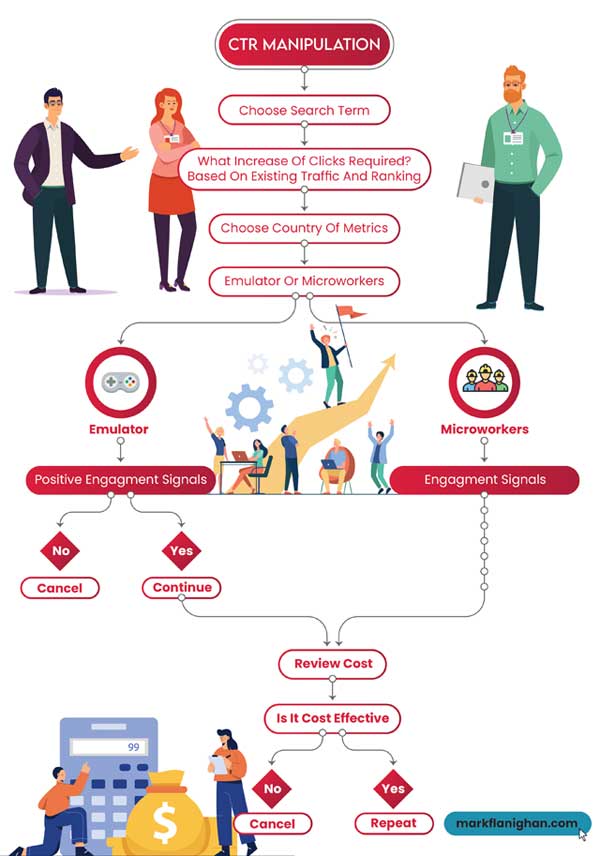LinkDaddy CTR Manipulation: Specialist Solutions to Raise Your Click-Through Rates
Wiki Article
Checking Out the Connection Between CTR Adjustment Providers and User Behavior
In the world of digital advertising and marketing, the impact of click-through rate (CTR) control solutions on customer behavior continues to be a complex and intriguing topic. As online systems increasingly rely on CTR metrics to gauge the success of web content, products, and solutions, recognizing how these manipulated rates effect user interaction and decision-making procedures is critical. The interplay between CTR manipulation and user actions increases inquiries concerning credibility, dependability, and the ethical effects of such methods. By studying the elaborate relationship in between CTR manipulation solutions and user actions, fascinating insights emerge that might improve our understanding of electronic advertising and marketing strategies and their effects on consumers.Effect of CTR Control on Behavior
Analyzing the influence of Click-Through Rate (CTR) adjustment on individual actions reveals vital insights into the characteristics of online engagement. CTR adjustment involves synthetically pumping up the variety of clicks on a particular link or promotion to deceive users and internet search engine. This practice can result in a distorted assumption of a page's popularity or significance, eventually influencing user behavior.
Additionally, CTR adjustment can skew the data utilized by formulas to individualize customer experiences. This can lead to users being offered web content that does not line up with their preferences or interests, inevitably leading to a decline in user fulfillment and engagement. Comprehending the influence of CTR control on customer actions is necessary for preserving transparency and count on on the internet communications.
Individual Interaction With Manipulated CTR
Customer interaction with adjusted CTR information typically brings about skewed perceptions of on-line web content appeal and importance. When users communicate with material based on artificially inflated Click-Through Fees (CTR), they may think that certain information, items, or solutions are much more preferred or reliable than they really are. This can lead to individuals making choices based on deceptive data, bring about potentially negative outcomes.Involvement metrics like likes, shares, comments, and time invested in a page are usually influenced by CTR manipulation. Individuals may be extra likely to involve with web content that appears to have higher interaction prices, better bolstering the cycle of skewed assumptions. Consequently, web content creators and marketers might focus on producing material that produces high CTR as opposed to concentrating on developing genuinely important and pertinent product.

Emotional Impacts of CTR Control

Furthermore, the emotional effects of CTR control can also materialize in modified decision-making procedures. Individuals may be much more inclined to click on web content solely based upon its regarded appeal, instead of its real worth or significance to their needs. This behavioral shift can cause a surface engagement with on-line material, where customers might overlook top notch but less popular offerings for those with synthetically improved CTRs.
Essentially, the psychological implications of CTR manipulation highlight the significance of keeping openness and credibility in on the internet interactions to cultivate genuine individual interaction and trust.
Ethical Factors To Consider in CTR Manipulation
Thinking about the ethical implications of controling click-through prices (CTR) in on-line platforms is essential for preserving honesty and trust fund within the digital ecosystem. CTR control increases issues about tricking individuals, distorting data analytics, and jeopardizing the reputation of online web content. One significant ethical consideration is the potential effect on individual autonomy and decision-making. By unnaturally blowing up CTR, individuals might be misdirected right into clicking on web links or ads they would certainly not have chosen or else, causing a disingenuous online experience. In addition, CTR adjustment can skew the efficiency metrics that businesses count on to make strategic decisions, inevitably affecting market competitors and consumer trust.One more honest facet to consider is the justness of controling CTR to obtain an unjust benefit over competitors. Involving in such methods not only violates principles of justice yet also weakens the depend on that users put in on the internet systems. It is important for services and electronic marketers to maintain moral standards in their methods to make sure openness, integrity, and long-term sustainability in the on the internet environment.
Effects for Digital Advertising
CTR control can lead to manipulated her explanation information analytics, misguiding marketing professionals right into thinking that their projects are carrying out better than they actually are. When individuals realize that CTRs have actually been adjusted, it can deteriorate trust in the brand, leading to long-lasting adverse repercussions for customer commitment and brand track record.In addition, using CTR control services can develop an unjust affordable landscape, where firms that engage in such practices gain an artificial advantage over those that abide by moral marketing standards. This can stifle development and imagination in digital advertising, as success becomes even more regarding adjustment tactics than supplying authentic worth to consumers. Inevitably, the effects of CTR manipulation for electronic advertising and marketing extend past short-term gains, influencing the total sustainability and integrity of advertising and marketing initiatives in the electronic realm.
Conclusion
In final thought, the connection between CTR adjustment solutions and customer actions is complicated and diverse. go to my blog The influence of CTR control on behavior, customer interaction with controlled CTR, psychological results, moral considerations, and effects for electronic advertising and marketing all play a role in shaping this relationship. Comprehending these characteristics is crucial for marketing news experts and scientists alike in order to browse the moral ramifications and optimize the performance of their digital advertising and marketing approaches.Report this wiki page